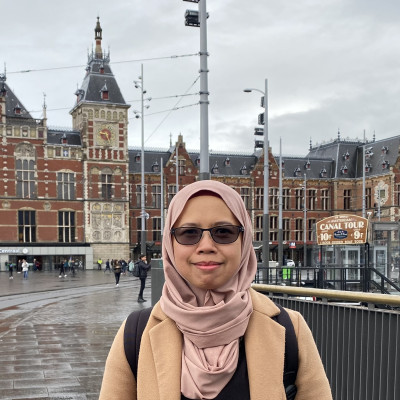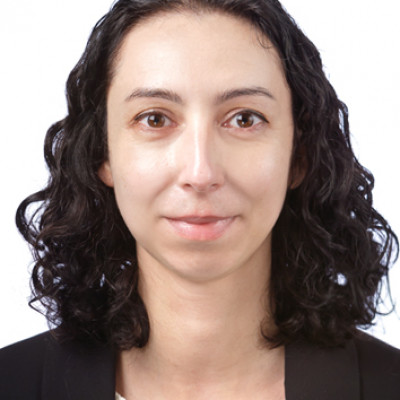Sessions / Location Name: P101
Physical Location
Location: P101
Building: Prime < Sookmyung Women's University, Seoul
Free Lunch with the Daejeon-Chungcheong Chapter #3849
Daejeon-Chungcheong Chapter
The Daejeon-Chungcheong Chapter is providing free pizza for those from the Daejeon-Chungcheong area! The lunch will be on day one of the Conference (Saturday, April 29th) at 12PM. We hope to see you there!
Reimagining the Language Classroom - Learner-Based Teaching #3471
Increasingly, educators are seeking more collaborative and student-centred pedagogies in the language classroom. One area that has the potential for realizing these goals is learner-based teaching. This study investigated students' attitudes towards learner-based teaching in their classrooms. Twenty-eight Japanese university students working in groups developed teaching content at two intervals over the duration of one semester. The groups then proceeded to teach the content to their classmates. Results from a post-performance questionnaire indicate that while creating their own content was challenging for students, especially when placed with non-familiar group members, most students signalled that it was overall an enjoyable experience. A further finding of this study that may have implications for language practitioners is that most students preferred more involvement in content creation for their classes.
"English Teaching Forum" Roadshow for Thai Primary School Teachers: A Collaborative Project #3637
Partner Session (ThaiTESOL)
The presentation showcases the "English Teaching Forum" Roadshow as a collaborative project between Regional English Language Office (RELO), US Embassy (Bangkok) and Thailand TESOL to conduct five workshops for Thai primary school teachers nationwide. This project celebrated the 60th anniversary of "English Teaching Forum" magazine, which publishes a number of articles on practical pedagogies and materials that cater for various learning needs and levels. This one-day on-site teacher training workshop was designed based on the perceived needs of teachers through an edutainment communicative teaching method. Each workshop aimed at both upskilling the teachers' English proficiency and promoting technology-enhanced teaching methods through the use of online materials. There were nearly 200 teachers from five regions in Thailand attending these workshops. They not only expressed positive attitudes toward the training as they gained first-hand experience to enhance their professional development, but also created a professional learning community within the region. This project highlights the mutual engagement between Thailand TESOL and RELO Bangkok to strengthen ELT communities in Thailand and expand wider networks of teachers who can potentially play key roles for young learners' English achievement during and beyond Covid-19.
Asset-enriching pedagogy for Interest-driven language learning: Tapping into students’ fannishness #3636
The field of TESOL has focused on how interest-driven practices (e.g., playing English-medium online games) facilitate incidental language and literacy development among language learners. Researchers have tried to bring students' interest-driven practices into formal language classrooms. This presentation shares the presenter's design-based research study on using popular pop culture content (TV shows) in her adult international English language learners in the U.S.. The presenter triangulated the three key elements - the learning potential of the target content, students' actual interest in the target content, and teacher's familiarity with the target content. Through the lens of affinity space (e.g., Gee, 2007) and L2 willingness to communicate (e.g., MacIntyre, et al., 1998), the qualitative analysis revealed how the course 1) evoked the feeling of fannishness' among the students to be more willing to communicate in English and 2) functioned as an affinity space that invited and enriched students' out-of-classroom interest-driven language practices.
Self-Directed Learning: Exploring the Continuous Professional Development of NESTs in South Korea #3633
This project explored the self-directed professional development (SDPD) that native English-speaking teachers (NESTs) in South Korea engaged in. Data was collected from 56 teachers who completed online questionnaires, 11 teachers of which also completed follow-up interviews. In the 12 months prior to the study, only 35 teachers engaged in SDPD. Findings indicated that teachers with education degrees interested in pursuing long-term EFL/ESL careers were the most likely to participate in SDPD. Of the teachers that failed to participate, multiple factors hindered involvement (e.g. lack of necessity). Consistent with research literature, the study participants did not appear to engage in sufficient professional development to increase student learning outcomes, completing only 1.23 SDPD activities on average. Considering our findings, this presentation includes recommendations to tackle SDPD at the individual, accreditation, and context levels. Attendees working and/or advising in education contexts wishing to further their knowledge of effective SDPD practices (e.g. reflection) will find this presentation informative.
Novice Learners’ Collaborative Work in Reflective Discussion Activities #3384
This study focuses on how reflective discussion activities is sequentially organized and collaboratively achieved by low-level learners who have limited opportunities for managing interaction. The study examines 34 video recordings of paired post-reading discussion activities among Japanese high school students using conversation analysis as a theoretical and analytical framework. Based on the preliminary analysis, the participants use what they have read as a shared resource to maintain conversation. When one participant has difficulty speaking further and there is a pause, the other treats it as a difficulty that both have to bear responsibility for. Reading the common material during class has enabled this practice. Additionally, it allows the other participant to make up for the initial difficulty, helping in constructing further turns or shifting to another topic. The results show the novice learners’ collaboration functions as affordances to explore their thought and indicate possible teachers’ roles as mediators of learning.
Locally Routinized Categorization for Pretend Play: Microanalysis of Preschoolers’ Interactive Book Reading #3629
This study highlights the effective implementation of Interactive Book Reading (IBR) in children’s L2 learning: a well-recognized activity to facilitate children’s active participation and literacy development in L1 contexts (Wasik & Bond, 2001). Using conversation analysis, the study analyzed 391 minutes of video-recordings of actual interaction between a teacher and preschool-aged children at an English immersion afterschool in Japan. The microanalysis details the teacher’s storytelling strategy that routinely categorizes the children as story characters through the use of repetitive utterance rhythm, prompts, and escalated affective stances. The categorization implicitly guides them to perform the appropriate character enactment timely, thereby positioning them as co-storytellers. It demonstrates such enactment is recycled by the children as a means of formulating incipient agentic L2 storytelling. The study argues IBR through pretend play affords young novice L2 learners affectively-charged storytelling practice, thus proposing one alternative approach to IBR to teachers in similar contexts.
Using Google Forms for Learners’ Self-Assessment to Enhance Learning and Foster Autonomy #3563
Learners’ self-assessment encompasses a true learner-centered approach and underscores the importance of involving learners in assessing their performance to develop proficiency and foster autonomy. In monitoring their learning strategies, skill development, study habits, and motivation, learners are positioned to understand which areas need attention. Using online self-assessment with Google Forms is a fast and simple way for learners to monitor their learning that is easily incorporated into instruction with little preparation. Additionally, self-assessment develops learners' critical thinking, as it involves evaluating the quality of their thinking and actions. The development of autonomy, along with critical thinking, positively enhances learners' motivation and achievement. The presenters share how EFL learner self-assessment using Google Forms can be incorporated into instruction increasing collaboration among instructors and students.
Preparing primary school teachers for CLIL: an action research project. #3559
Since the Taiwan government launched the Bilingual National 2030 policy in 2018, primary schools have been encouraged to teach non-English subjects using content and language integrated instruction (CLIL), where the language is English. For example, schools need to compete for extra funding by transforming traditionally Chinese-taught courses into CLIL courses. However, very few primary school teachers are confident and competent in adopting CLIL, and many express concerns about their insufficient English proficiency. To address teachers’ concerns, this study aims to provide primary school teachers with CLIL training and understand to what extent such training benefits teachers. Data are collected from recordings of the CLIL workshops and class observations. In this presentation, I will report some preliminary findings, some methodological challenges that arose from the collaboration between university researchers and primary school teachers, and how these challenges were resolved.
Utilisation of Kahoot! in University Pathway Programs #3556
This presentation will focus on utilising Kahoot!, which is described on the website as a platform “to create, share, and host learning sessions that drive compelling engagement”. The presenter utilises Kahoot! to supplement core teaching materials and increase learner motivation while delivering intensive university pathway programs for international students in Australia. Recent second language acquisition research has investigated the importance of the learning environment for skills development, including studies related to the positive motivational impact of gamification resources (Dianati, Nguyen, Dao, Iwashita & Vasquez, 2020). Learners with high motivation and a low level of anxiety are better equipped for success. Gamification is especially valuable method to lower the affective filter in language classrooms. The presenter will demonstrate how Kahoot! provide opportunities to broaden the learning experience and develop multiple language skills. The session will include examples of quizzes based an extensive range of academic themes. Audience members will have an opportunity to participate in some interactive Kahoot! quizzes and a discussion about experiences with using gamification as a pedagogical resource.
Horizontal Collaboration: Intra-departmental Integration as a Bedrock for SLA #3554
Horizontal integration across university curricula is an oft cited ambition but one which frequently falls foul of instructor individualism, on the ground realities, and communication shortfalls. We put to the test the theory that inter-syllabi coordination could prove beneficial for second language acquisition. In one class, students worked on cooperative projects, including making a short movie. In another, they studied creative writing, producing their own poems, stories and scripts. In a third, they were learning academic writing with a particular emphasis on peer review skills. However there was no specific integration between these three syllabi. When it was discovered that nine students were enrolled in all three courses, it presented an ideal opportunity to test horizontal integration in a controlled real-world context. This research report will explore the theories behind horizontal integration before explaining the methodology of the experiment, the results and the lessons learned for the future.
Teacher Empowerment through Collaboration: Teaching Grammar as a Meaning-Making Resource #3553
This paper will discuss the benefits of the collaborative efforts of a team comprising seven EL teachers from a Singapore primary school and an EL academic from the local, national institute of teacher education engaged in an action research (AR) project. The AR project focused on the teaching of grammar as a meaning-making resource within the EL writing classroom. The project involved professional development sessions on the knowledge of grammar as a meaning-making resource, the revision of existing instructional materials to integrate the teaching of grammar within the teaching of writing, and the actual classroom teaching of grammar as a meaning-making resource in writing. Based on findings from interviews of two teachers on the team who were involved in the classroom teaching phase, the paper will present how such a collaborative project can be empowering in terms of enhanced teacher knowledge and improved teaching practices in the EL writing classroom.
A Technology Enhanced Social-cognitive Approach to Improve EFL Learners’ Public Speaking #3543
EFL learners’ public speaking is commonly influenced by cognitive factors like proficiency level, affective factors like anxiety and motivation, and environmental factors like class sizes and time constraints. Yet, recent developments in technology, including Artificial Intelligence, Automatic Speech Analysis, and Virtual Reality, may enhance language learning by offering accessible and personalized learning experiences. This study proposes an approach, Technology Enhanced Socio-cognitive Teaching (TEST), on improving public speaking skills of Taiwanese EFL learners. Twenty-five sophomore English majors participated in the study, taking a one-semester speaking class, using theme-based mobile applications to facilitate speaking practices, and interacting with each other through apps. Quantitative results show that students’ anxiety level dropped and the technology acceptance level went up. Qualitative surveys indicate a favorable attitude toward apps with an instant messaging function, highlighting the importance of social interaction in oral training. Findings confirm the positive effect of TEST on improving EFL learners’ public speaking.
Motivating Adult Korean Students Through the Characteristics and Behaviors of Language Teachers #3589
Current qualitative research illustrates the need for further research in specific language learner motivation contexts. The focus of this presentation is exploring the Korean adult learner context. The research aims to expand on work done by Dornyei and Csizer (1998) and also to find emerging characteristics that can be used by instructors in the context of the Korean classroom. The phenomenological qualitative research approach will be used, utilizing two groups of participants; Korean adult English learners and foreign adult English language teachers. Through two different methods of data collection (open-ended surveys and one-on-one interviews) data will be formulated using the Otter.ai and NVIVO software programs. Data will then be coded into groups and themes to interpret results and derive conclusions. The presenter will offer recommendations based on current research and anticipated trends in Korea. Audience participation is invited and encouraged to contribute to the ongoing research.
Rethinking Teacher Quality of Indonesian EFL Teachers #3592
The study is conducted to respond to the issue of English teacher quality in Indonesia. Despite the importance of English as a language taught and tested in Indonesian schools, there are issues concerning the competence of English teachers. Responding to this issue, the Indonesian government enacted some regulations which incorporate the mandated competencies to be achieved by teacher candidates in initial teacher education programs as well as to manage teacher professionalization. However, there is a lack of research on understanding the competency of teachers and their professional journey from teachers’ own perspectives. The information gathered from the teachers could be beneficial for policymakers to improve Indonesian education in a more democratic way. Therefore, employing the sociocultural perspective, this study will investigate EFL teachers' perceptions of teacher quality seen from their professional formation at pre-service teacher education programs.
Exploring a Potential Suitable Model for ETEPs (English Teacher Education Programs) in the Indonesian Context #3622
Studies noted unsatisfactory students’ English proficiency levels in the Indonesian context that potentially connect to the insufficient English teachers’ quality in this country. This study explores the possible suitable model of ETEPs in the Indonesian context from the perspectives of 66 internal stakeholders at four ETEPs. The data of this study gathered from interviewing four head of ETEPs, 10 teacher educators, 11 graduates, and conducting focus groups with 41 student teachers. The data were analysed using thematic analysis. The findings suggest that ETEPs should 1) apply tighter admission procedures 2) offer courses related current trend in ELT (English Language Teaching), 3) offer balance general and classroom English courses, 4) emphasis on reflection in teaching practice courses, and 5) provide compulsory and guided extracurricular activities. As such, this study can add to the limited literature on ETEPs model, and, ultimately, contribute to the quality of English teachers and Indonesian students’ English proficiency.
The Frequency of the Academic Words in American Sitcom The Big Bang Theory #3627
This study examines the use of academic words in The Big Bang Theory (TBBT), a popular American TV show known for its characterization and academic jargons. The aim of the study is to create a 100-word frequency list and 100-word academic word list for TBBT, and identify the most commonly used academic words in the show. Adapting a corpus-based approach, episodes from the first to ninth season were collected to create a TBBT corpus in Sketch Engine. The TBBT frequency list was generated using AntWordProfiler and compared with Coxhead's Academic Word List to create TBBTAWL. The findings suggest that both TBBT frequency list and TBBTAWL can serve as useful references for English language learners and instructors. This study highlights the significance of incorporating authentic language materials into language learning activities, and underscores the potential benefits of using television shows as a tool for language acquisition.
Integration of the 5E Model of Instruction in Bilingual Earth Science Class in a Senior High School in Taiwan #3630
This study aims to investigate how the content teachers apply 5E Model into bilingual classes and how students perceive this course design. Recently, the Taiwanese government launched the ‘Blueprint for Developing Taiwan into a Bilingual Nation by 2030’. In response to this policy, many teachers in Taiwan have implemented various bilingual teaching methods to help students comprehend and acquire both content and language knowledge. Some designed their courses using the 5E Model to give students clear guidelines. Little is known about the effect of the 5E Model in bilingual classes and if it works well in a Taiwanese context. This study aims to address this gap through questionnaires and interviews with both students and teachers in a bilingual earth science course in a senior high school in Taiwan. There are practical findings for bilingual teachers to develop comprehensive bilingual courses integrating the 5E Model.
Investigating Korean Primary School Teachers' Perceptions: Using AI English Assistive Technology, Pengtalk #3387
Will Artificial Intelligence (AI) replace English teachers in South Korea? This research investigates using AI for English education in Korean primary schools, including its advantages, disadvantages, and recommendations. The study employs qualitative methodology and semi-structured interviews (SSI). The participants are all qualified teachers and have experience teaching English with the government-funded programme AI Pengtalk. The transcribed data are analysed using a thematic coding approach. The findings reveal that the significant successes of AI in English education are (1) the effectiveness of classroom management, (2) the adoption of new technology, and (3) the positive cognitive approach (individualisation, equality, motivation, and autonomy). On the other hand, the results also stress the limitations, (1) ethical issues with AI, (2) lack of flexibility, and (3) weakness of speech recognition. It can be concluded that AI is a valuable resource for assisting English teaching and learning, but it is still in its start-up stage.
Graduate Student Showcase #3739
Please join our graduate student showcase to meet the next generation of educators and innovators in language education. More information is coming soon.
Using English as a Lingua Franca to Resist against Language Socialization #3533
Learners are socialized both into and through language by means of interactions with others. Drawing on a language socialization theoretical framework, this research examines narratives from a Chinese student, Jin (pseudonym) in Japan to shed light on her identity development in the struggle of learning Japanese and using English. Interviews were conducted twice based on fully consenting, after which the transcriptions were read through several times to grasp a whole picture of the interviewee and analyzed by MAXQDA. As a result, insights into language learning motivation and language choice are provided. In Jin’s case, she adopts English as a Lingua Franca to escape from being required as a part of the Japanese community and from acculturation into the local culture. On the other hand, Jin’s low motivation for learning Japanese can be also accounted for by the inconvenience of using Japanese as a foreigner in Japan.
English Language Education for Indigenous Students in Rural Malaysian Borneo: Teachers’ Perspectives #3561
As with most other former British colonies, the English language education policies for national schools in Malaysia are formed on the basis of English being a second language (ESL) due to the persisting importance of the language in different facets of Malaysian society even after gaining independence. However, little is known about the implications of such policies on the students in rural parts of Sabah, a state in Malaysian Borneo, where students are primarily of indigenous backgrounds, and English is closer to a foreign language than it is a second language. Therefore, this study intends to explore this issue through a multi-method approach, including narrative interviews with ten English language teachers in rural schools of Ranau District in Sabah. The presentation will discuss the implication of ESL policies towards English education for indigenous students in rural schools by looking at the teachers’ perspectives, mainly based on their own experiences.

















